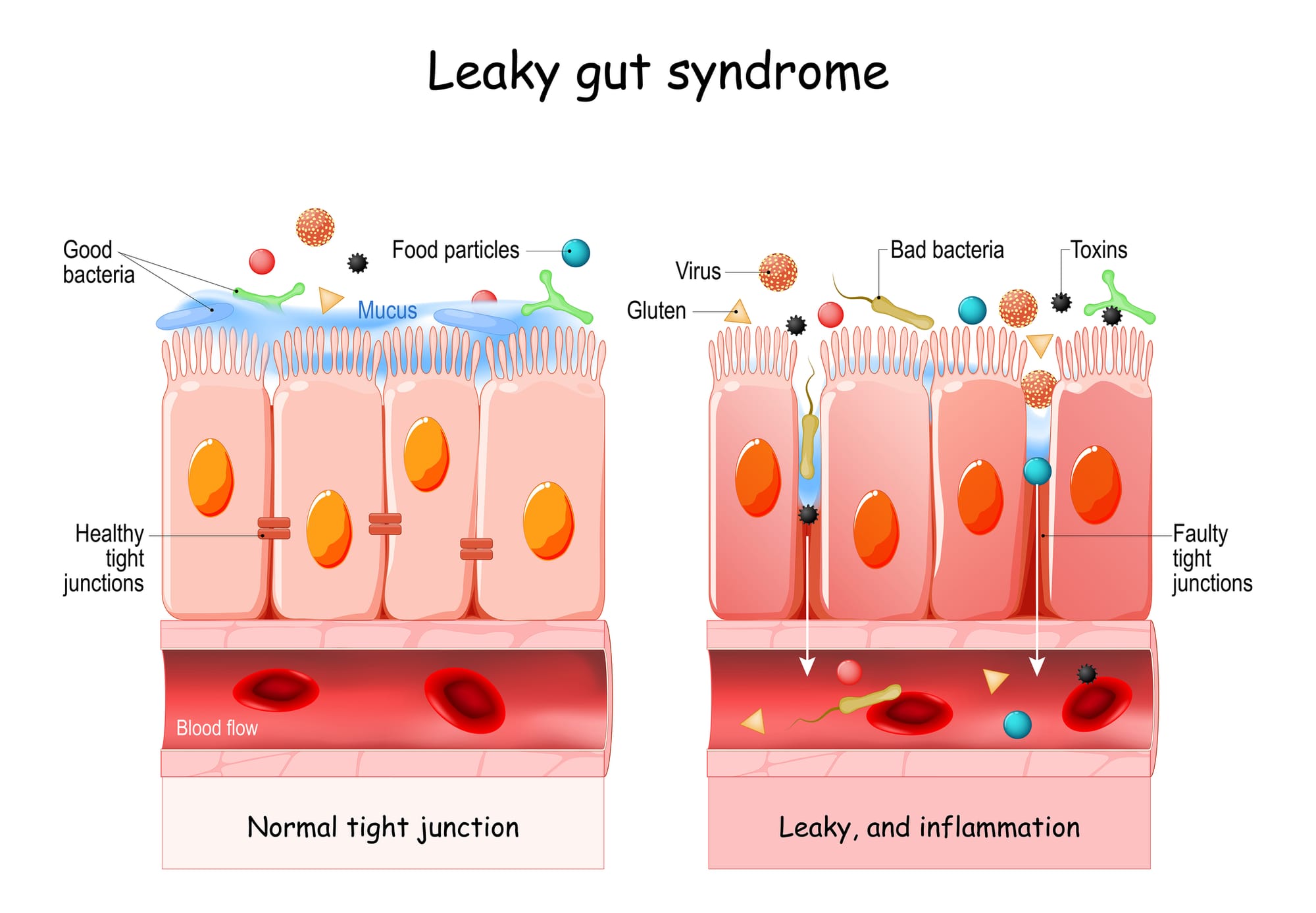Leaky Gut

Gastrointestinal health involves the silky-smooth functioning of the digestive system, which means maintaining a strong gut barrier with reinforced integrity.
While the integrity is important, processing food by breaking it down for efficient absorption allows the body to extract and use important micro and macro nutrients while keeping your intestinal tract free of digestive issues and discomfort.
Anything which disrupts the gut barrier will tear down one of the body's major lines of defense against foreign, harmful enemies. Think of the gut barrier as a strong thick multi layer wall guarding against intruders trying to make their way into your body through the stuff that makes it into your mouth on the way through your intestines.
Increases gut permeability happens when this strong dense wall of defense crumbles and has holes failing, its main purpose of preventing intruders from entering.

Major culprits for increased gut permeability
- Diet
- Medications
- Stress
- Microbiome dysbiosis
- Infections
- Alcohol intake
- Lack of sleep
- Chronic inflammation
- Genetics
- Environmental factors
Common Disease Association
The literature contains common diseases that researchers show to be associated with leaky gut or poor intestinal permeability, but concrete evidence linking the disease process and the gut has remained elusive for now.
- Inflammatory bowel disease (Crohns and Ulcerative colitis)
- Irritable Bowel Syndrome
- Celiac disease
- Food sensitivities
- Autoimmune diseases like rheumatoid arthritis, Lupus and Diabetes type 1
- Allergies
- Chronic fatigue
- Mood disorders
- Metabolic syndromes (obesity, DM2, and non-alcoholic fatty live disease)
Symptoms of Leaky Gut
Smooth sailing for the intestinal tract and its systems should be boring and without illness. Some common signs and symptoms which may manifest resulting from increased intestinal permeability.
- Abdominal pain
- Bloating
- Diarrhea/Constipation
- Fatigue
- Joint pain
- Skin problems (eczema, psoriasis)
- Headaches
Immune System dysregulation
Some theories exist hypothesizing maladaptation of the immune system, which results because of increase gut permeability.
Systemic inflammation from leaky gut causes bacterial endotoxins to leak into the bloodstream. A hyperactive immune system also results from foreign substances which lead to autoimmune disease.
Food sensitives result from undigested food particles entering the blood stream
All these harmful effects promote immune dysregulation and, as the immune system is trained in the gastrointestinal system, a poor intestinal barrier leads to poor immune function.
How to fix leaky gut
Diet
Remove potential triggers like dairy and gluten.
Remove processed foods completely. These foods destroy gut permeability.
Focus on nutrient dense whole foods
Keep a food journal to track and note what works, and what does not.
Prebiotics and probiotics
Consider incorporating probiotic-rich foods (yogurt, kefir, sauerkraut) or taking a probiotic supplement.
Consider using spore forming probiotics which are more resilient and can survive the harsh environmental conditions of the intestinal system. They can be more effective and beneficial.
Bacillus coagulans, Bacillus subtilis and Bacillus clausii are some examples of spore forming probiotics
Digestive enzymes
Supplements typically contain a blend of amylase, lipase, protease, and sometimes other enzymes to support the breakdown of carbohydrates, fats, and proteins.
Bromelain supplements, which are derived from pineapple, have a reputation for their protein-digesting properties.
Stress management
Consistently managing stress by practicing daily strategies using meditation, breathing, or yoga can prevent gut permeability and maintain a health barrier.
Avoiding Irritants
You should avoid non-steroidal anti-inflammatory medications like ibuprofen and antibiotics because they increase gut permeability as well as reducing excessive intake of alcohol.
Hydration
Adequate water intake is an underestimated resource for essential gastrointestinal health. Hydration not only aids in the intestinal cell wall function, but also helps create a healthy environment for the microbiome. 1-3 liters a day based on the level of activity.
Summary
The strength of your intestinal barrier determines your health. Your line of defense is the microbiome, mucous, and your intestinal cells. Foreign attackers are always entering our gastrointestinal system, so we need to keep our body prepared and protected. Of the many chronic diseases, there is no coincidence leaky gut plays a role. Healthy gut healthy life.